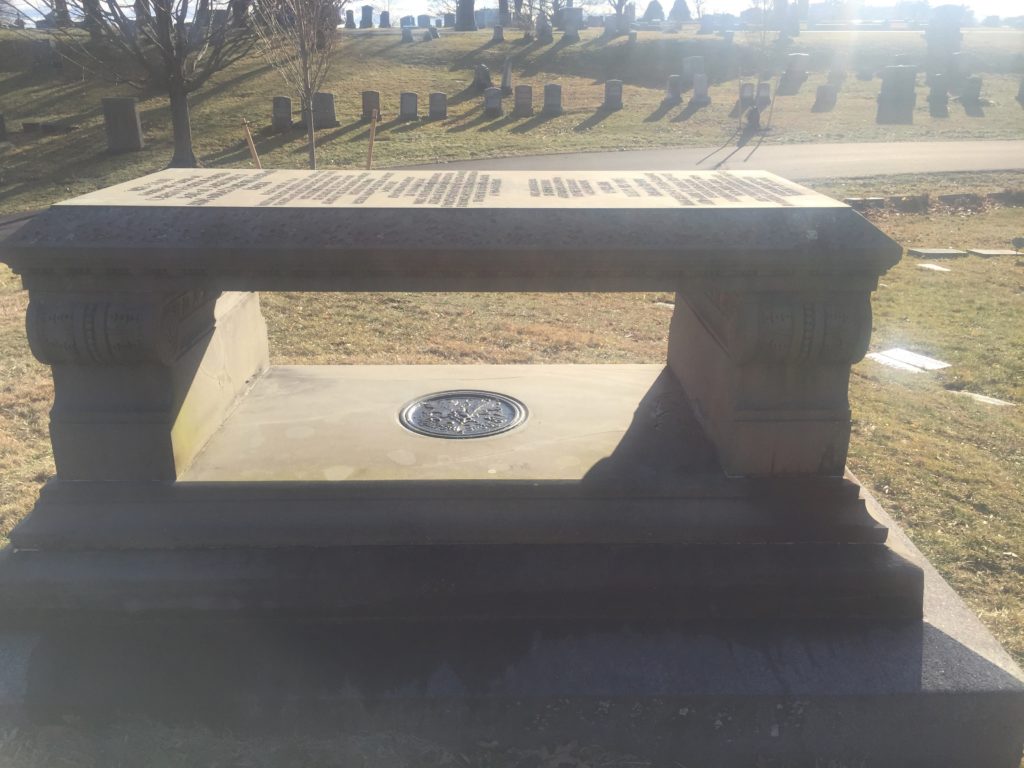Erik Visits an American Grave, Part 733
This is the grave of Charles Francis Adams, Sr.


Born in 1807 into America’s most elite political family, Charles Francis was the only one of John Quincy Adams‘ kids who wasn’t a complete mess. While many of the children in that family caved under the pressure of expectations, a few rose to them and Charles Francis definitely was one of them. He went to Boston Latin and then Harvard, graduating in 1825. He went to study law under no one less than Daniel Webster, which is what happened if you were an Adams. He then became a lawyer, practicing in Boston and started writing history in his free time. For the first decade or so of his professional life, he pretty much stuck to this and stayed out of active politics.
In 1840, Adams ran for the Massachusetts statehouse and won. He won an additional two one-year terms. He then ran for Massachusetts senate and won that in 1843, serving a two-year term. In 1846, he left the statehouse to run a Whig newspaper in Boston. A pretty committed abolitionist at this time, like his father, Adams was the VP candidate for the Free Soil Party, which ran the rather not abolitionist Martin Van Buren as its presidential candidate. Van Buren agreed to do this because he was so angry that he had been denied the 1844 nomination that went to James Polk when the South determined the former was not pro-slavery enough for them. Obviously, they did not win.
Adams spent much of the 1850s editing his grandfather’s papers, releasing the first volumes of them. He also wrote other volumes of his family’s history. In some ways, he was one of the first genealogists, obsessed by his own family’s contributions to America, which was understandable.
In 1858, Adams went to Congress as a Republican. He was reelected in 1860. In 1861, Abraham Lincoln tapped him to become ambassador to Britain. This was a critical role. It would have been a disaster had the British recognized the Confederacy. There was a real chance they could have done so. Undermining the growing American empire was very much in their interest. So was having good relationships with the South, for which they still depended on for their cotton, only making the adjustment to large-scale production in India and Egypt during the Civil War. Moreover, Lord Palmerston, William Gladstone, and other leading British politicians had a lot of sympathy for the Confederacy. So Adams faced an extremely difficult task here.
Adams handled this all masterfully. First, he took care of the Trent Affair, when Charles Wilkes had foolishly ordered the arrest of Confederate diplomatic representatives to Britain, a huge violation of protocol and something which inflamed opinion against the U.S. Adams did have some ace cards. The U.S. was a major food exporter to the British and Adams threatened to cut that off entirely. He also threatened to attack British ships and while the British navy was a lot stronger than the American navy, was it really worth it to the British to lose any ships over the Confederacy? Finally, once Lincoln issued the Emancipation Proclamation, it was impossible for British leaders to recognize the Confederacy since the British public was strongly abolitionist and if the war was now about slavery, then the British had to stay out of it.
Adams remained in London as ambassador through 1868. He was offered the presidency of Harvard, but turned that down. He went back to writing his histories and built a presidential library to honor his father. But while Adams initially came from an abolitionist background, his actual interest in Black rights was quite fleeting. Like a lot of wealthy New Englanders outraged by the corruption in the Grant administration and the vigorous prosecution Black rights in Reconstruction, Adams was a major supporter of the Liberal Republican movement. This ended up nominating Horace Greeley to run against Grant in 1872, though many in the movement would have preferred Adams to run. The Democrats took on Greeley too but it was one of the most disastrous and shameful campaigns in American history. Grant won in a landslide. That year, Adams also returned to Britain to settle the Alabama Claims, when the U.S. was suing the British for damaged caused by ships they had sold to the Confederacy during the war. The British eventually paid the U.S. $15 million in damages.
By the mid-1870s, Adams growing conservatism drew him out of the Republican Party entirely. He became a Democrat in 1876 when the Democrats nominated to be governor. He lost but remained in the party for the rest of his life. It got bad enough in 1876 that Thomas Nast lampooned him in The Fall of Adams. Adams died in 1886, at the age of 79.
Charles Francis Adams is buried in Mt. Wollaston Cemetery, Quincy, Massachusetts.
If you would like this series to visit other ambassadors to Britain, you can donate to cover the required expenses here. Reverdy Johnson is in Baltimore and Robert Schenck is in Dayton. Previous posts in this series are archived here.


